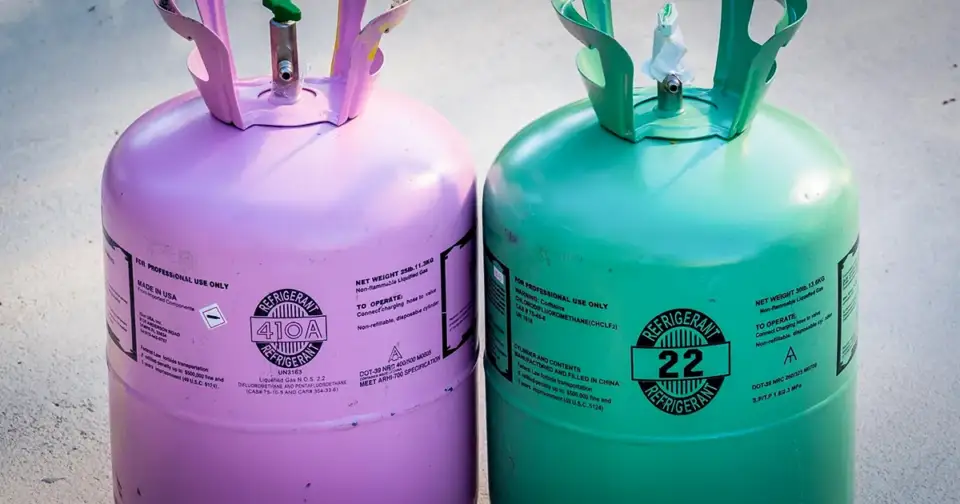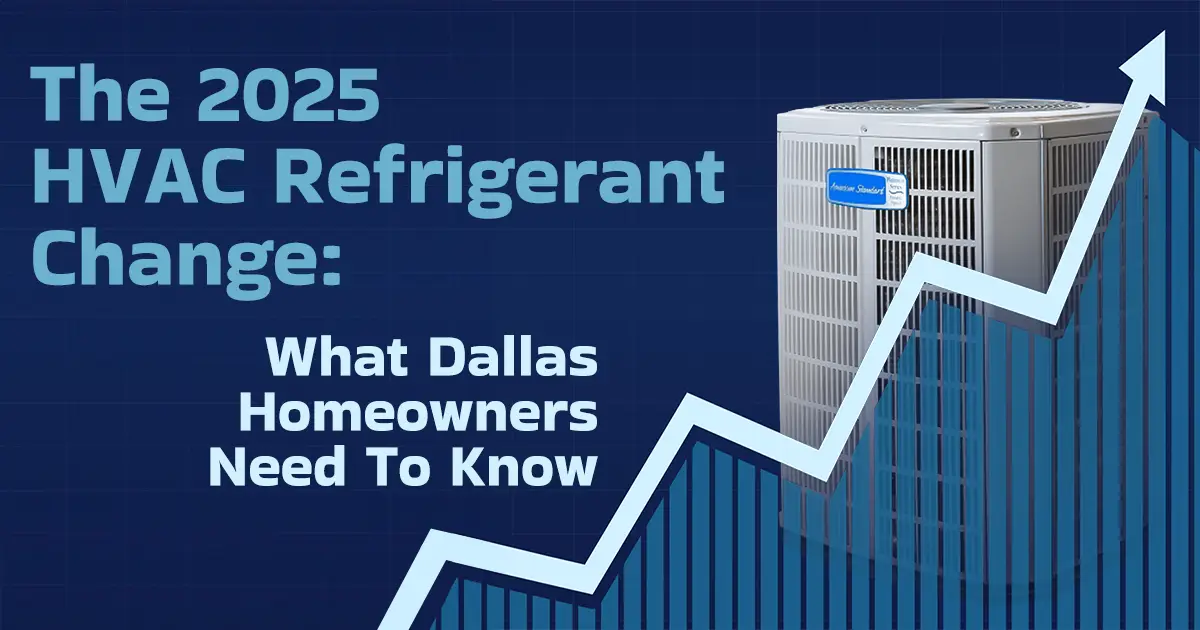The major change we have anticipated for over a year has finally arrived. As of January 1, 2025, new federal regulations have banned the production of air conditioning and heat pump systems that use the commonly known refrigerant R-410A. This transition is part of a more significant environmental effort to reduce the global warming potential (GWP) of refrigerants used in residential and commercial HVAC systems.
If you’re a homeowner in Dallas or the surrounding North Texas area, this change could impact you in more ways than one. From higher prices to limited equipment availability, now is the time to understand what’s happening, why it matters, and what you can do to stay ahead of the curve.
As always, AC Rescue strives to help our customers make informed, confident decisions about their comfort and budget. So, let’s walk through what the 2025 refrigerant mandate means for you.
What Is the 2025 Refrigerant Mandate?
The 2025 HVAC refrigerant mandate stems from the American Innovation and Manufacturing (AIM) Act, which was passed in 2020 to reduce the use of harmful hydrofluorocarbons (HFCs) in HVAC and refrigeration systems. The Environmental Protection Agency (EPA) is now enforcing this transition by phasing out high-GWP refrigerants like R-410A, which is currently used in most residential air conditioning systems.
Manufacturers like American Standard and Carrier can no longer produce new HVAC systems that use R-410A for residential and light commercial applications. The goal is to replace this refrigerant with more environmentally friendly alternatives, primarily R-32 and R-454B, which fall under a new category called A2L refrigerants. These refrigerants have a significantly lower GWP and are crucial in reducing greenhouse gas emissions.
It’s also worth noting that the sale of non-field-assembled systems (like window AC units and packaged units) that still use R-410A will be allowed until January 1, 2028, but split-system units must either be installed by the end of 2025 or meet the new refrigerant standards. These deadlines are quickly approaching, and understanding them now can help you avoid being caught off guard.

How This Affects Dallas Homeowners
Here in Dallas, where our summer heat is no joke, your HVAC system works overtime to keep your home comfortable. The refrigerant transition will impact homeowners differently, depending on your age, condition, and HVAC system type.
First, let’s be clear—you don’t have to replace your current HVAC system because it uses R-410A. Existing systems can still be used and serviced legally. However, while the refrigerant will still be available for repairs, prices will likely increase due to limited supply.
Additionally, parts for R-410A systems may become harder to find as manufacturers shift production to the new A2L-compatible systems. So, while you won’t be forced to make a change immediately, the cost and convenience of servicing older systems may become more challenging.
Another important point to consider is that new HVAC systems built to accommodate the upcoming A2L refrigerants will be more expensive. Industry experts anticipate a 20% to 30% increase in system costs due to new safety designs and more advanced components. These newer systems are built with features like integrated leak detectors and improved ventilation to ensure safe operation with mildly flammable refrigerants like R-32 and R-454B. While these safety features are necessary, they also contribute to the rising costs of these next-generation units.
Finally, if you wait too long to upgrade, you may also face delays and limited availability due to supply chain issues. Just like we saw with other home-related goods during the pandemic, the demand for compliant HVAC systems could easily outpace supply. That’s especially true in places like Dallas, where many homeowners rely on their air conditioning nearly year-round. Waiting until the last minute could mean being stuck in the heat—or paying significantly more to install a unit quickly.
So, What Should You Do Now?
The first step is to schedule a professional HVAC inspection. If you’re unsure what refrigerant your system uses or how old your equipment is, we can help. At AC Rescue, we offer comprehensive system inspections that give you a clear picture of your system’s current health and what options you have for repair, maintenance, or replacement.
Next, consider whether an early upgrade makes sense. If your unit is already showing signs of age, struggling to keep up during the hot Dallas summers, or requiring frequent repairs, replacing it now could be a smart financial move. Not only would you lock in lower equipment prices, but you’d also benefit from newer energy-efficient models that could reduce your monthly utility bills.
If you’re not quite ready to replace your system, that’s okay. But it’s a good idea to start planning and budgeting for a future upgrade. Setting aside a home improvement fund and understanding your equipment’s timeline can help prevent last-minute surprises.
It’s also important to work with a certified and trained HVAC technician. A2L refrigerants are considered “mildly flammable,” meaning they must be handled carefully. You’ll want to ensure that your HVAC company, like AC Rescue, is trained and certified to work with these refrigerants. We’ve taken the necessary steps to stay ahead of the curve so that our team is fully prepared to support you safely and effectively when the transition happens.
Final Thoughts
If you’re considering upgrading your air conditioner or heat pump, don’t wait any longer. Contact AC Rescue today to schedule your system inspection or replacement consultation. We’re proud to serve homeowners across Dallas, Fort Worth, and surrounding areas with fast, friendly, and reliable HVAC solutions. Call us at (972) 278-6800 to book your appointment today.
Together, we’ll keep your home cool, efficient, and ready for the future—no matter what Texas weather throws our way.

